

The Manifesto for Teaching Online: Amazon.co.uk: Bayne, Sian: 9780262539838: Books. Digital tools: when companies offer work experience that is 100% virtual - Planet Labor. Education Trends. Key indicators on education, skills and employment 2020. Learning outcomes of the COVID-19 pandemic: another perspective. Briefing note - Adult learning and continuing vocational education and training valued by Europeans. Sweden's environmental education is building a generation of Greta Thunbergs.
Futures Literacy. Why is Futures Literacy important?
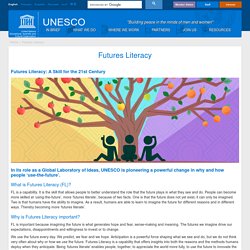
FL is important because imagining the future is what generates hope and fear, sense-making and meaning. The futures we imagine drive our expectations, disappointments and willingness to invest or to change. We use the future every day. We predict, we fear and we hope. Anticipation is a powerful force shaping what we see and do, but we do not think very often about why or how we use the future. UNESCO is building a Global Futures Literacy Network Starting in 2012 UNESCO began shifting its foresight activities towards the development of Futures Literacy and the Discipline of Anticipation. Over the last few years 8 UNESCO chairs have been initiated in Finland, Greece, Italy, Malaysia, Netherlands, Tunisia, United Kingdom, Uruguay. A special project is also underway, the Imagining Africa’s Futures project, funded by the OCP Foundation of Morocco, is providing an exceptional opportunity to conduct prototype testing of UNESCO’s Futures Literacy Laboratories.
FutureMotions introductiondoc January2018. Futures of Education - LEARNING TO BECOME. Expanding AI’s Impact With Organizational Learning. Sam Ransbotham (@ransbotham) is a professor in the information systems department at the Carroll School of Management at Boston College, as well as guest editor for MIT Sloan Management Review’s Artificial Intelligence and Business Strategy Big Ideas initiative.
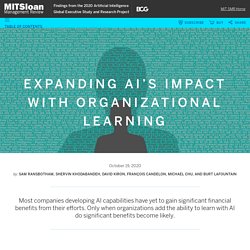
Shervin Khodabandeh is a senior partner and managing director at BCG, and the co-leader of BCG GAMMA (BCG’s AI practice) in North America. He can be contacted at shervin@bcg.com. David Kiron is the editorial director of MIT Sloan Management Review, where he directs the publication’s Big Ideas program. He can be contacted at dkiron@mit.edu.
Beyond the Classroom Walls: An opportunity for an inclusive digitalisation of education. This article is part of a series in which OECD experts and thought leaders — from around the world and all parts of society — address the COVID-19 crisis, discussing and developing solutions now and for the future.
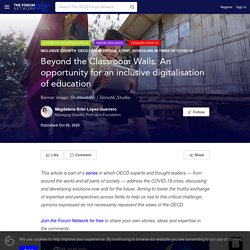
Aiming to foster the fruitful exchange of expertise and perspectives across fields to help us rise to this critical challenge, opinions expressed do not necessarily represent the views of the OECD. Great Expectations: How will the rise in online learning expand the teaching profession? This article is part of a series in which OECD experts and thought leaders — from around the world and all parts of society — address the COVID-19 crisis, discussing and developing solutions now and for the future.
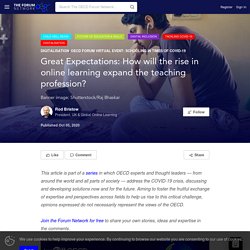
Aiming to foster the fruitful exchange of expertise and perspectives across fields to help us rise to this critical challenge, opinions expressed do not necessarily represent the views of the OECD. Join the Forum Network for free to share your own stories, ideas and expertise in the comments. The rise of online learning during the COVID-19 pandemic. The COVID-19 has resulted in schools shut all across the world.
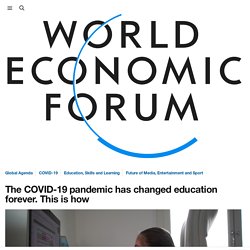
Globally, over 1.2 billion children are out of the classroom. As a result, education has changed dramatically, with the distinctive rise of e-learning, whereby teaching is undertaken remotely and on digital platforms. Research suggests that online learning has been shown to increase retention of information, and take less time, meaning the changes coronavirus have caused might be here to stay.
New Ways of Learning. Il y a un an, Agoria publiait son étude 'BeTheChange' dans laquelle nous soulignons que l'avenir du travail est en train de changer et quelles actions les entreprises doivent entreprendre pour s'y adapter.
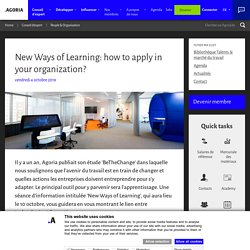
Le principal outil pour y parvenir sera l'apprentissage. Une séance d'information intitulée 'New Ways of Learning', qui aura lieu le 10 octobre, vous guidera en vous montrant le lien entre technologie et formation. One year ago, Agoria published the study ‘BeTheChange’ where we highlight that the future of work is changing and what actions companies can take towards this future. ETUCE/FES webinar: Education Trade Unions and Young Members - European Trade Union Committee for Education. In cooperation with the Friedrich-Ebert-Stiftung (FES) ETUCE organised its first workshop on “Education Trade Unions and Young Members”, on 17 September 2020.
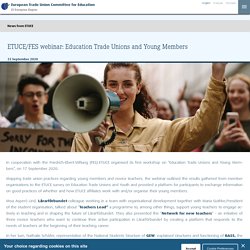
Mapping trade union practices regarding young members and novice teachers, the webinar outlined the results gathered from member organisations to the ETUCE survey on Education Trade Unions and Youth and provided a platform for participants to exchange information on good practices of whether and how ETUCE affiliates work with and/or organise their young members. Moa Asperö Lind, Lärarförbundet colleague working in a team with organisational development together with Maria Guthke,President of the student organisation, talked about “Teachers Lead” a programme to, among other things, support young teachers to engage actively in teaching and in shaping the future of Lärarförbundet.
The importance of being vocational: Challenges and opportunities for VET in the next decade. European Vocational Skills Week 2020 - Employment, Social Affairs & Inclusion. The fifth European Vocational Skills Week will be held online on 9-13 November 2020.
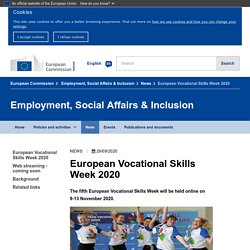
Some of the meetings are carried over from previous years (such as the meeting on the European Alliance for Apprenticeships), while others are NEW, such as the launch of the Pact for Skills and a meeting dedicated to the role of social partners. The Pact for Skills is a proposal by the European Commission as a new engagement model for skills that will help meet COVID-19 challenges and deliver on the ambitions of the recovery pathway, the EU Industrial Strategy and the green and digital transitions. This year VET stakeholders are encouraged to organise Week-associated digital events and activities in the Member States at local, regional and national level to promote VET. These can be webinars, digital press campaigns, online careers fairs, Facebook Live, Instagram Live or other mainly online gatherings.
Web streaming - coming soon. The Bologna Process and the European Higher Education Area. What is the Bologna Process?

The Bologna Process seeks to bring more coherence to higher education systems across Europe. It established the European Higher Education Area to facilitate student and staff mobility, to make higher education more inclusive and accessible, and to make higher education in Europe more attractive and competitive worldwide. Digital Education Action Plan (2021-2027) European Education Area. Digital skills & learning. Education at a Glance 2019: OECD Indicators. OECD Skills Outlook 2019: Thriving in a Digital World. The Future of knowledge use in societal decision-making. Wicked problems and the transformation of the information environment compel us to rethink how knowledge is used in societal decision-making.
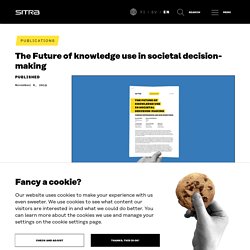
The improvement of the balance of information supply and demand and the strengthening of the position of scientific knowledge are important goals, but they alone are not enough. A new mindset, new ways of working at the knowledge-policy interface and structures that facilitate these new ways are required. This scientist made a Google Doc to educate the public about airborne coronavirus transmission. Why did you make this document instead of going down the traditional science publishing route? Science publishing is very slow. Realizing the promise: How can education technology improve learning for all?
Leading up to the 75th anniversary of the UN General Assembly, this “Realizing the promise: How can education technology improve learning for all?” Publication kicks off the Center for Universal Education’s first playbook in a series to help improve education around the world. It is intended as an evidence-based tool for ministries of education, particularly in low- and middle-income countries, to adopt and more successfully invest in education technology. While there is no single education initiative that will achieve the same results everywhere—as school systems differ in learners and educators, as well as in the availability and quality of materials and technologies—an important first step is understanding how technology is used given specific local contexts and needs.
The surveys in this playbook are designed to be adapted to collect this information from educators, learners, and school leaders and guide decisionmakers in expanding the use of technology. Computer-adaptive learning 1. COVID-19 has revealed the cost of disrupted education and child care inequality - Atlantic Council. ToniAnn Brand works with her 7th grade daughter Madison, 12, during her first virtual Toms River Intermediate North class from their home Tuesday, September 8, 2020. (Via REUTERS) While the smell of barbecue might still have permeated the air of back yards and parks across America this past Labor Day weekend, the end of summer 2020 feels far from festive.
More than 55 million Americans who have been out of work didn’t have a holiday to celebrate, and unemployment around the world remains at record highs as countries struggle to control the pandemic and take measured steps to rebound from shutdowns and the recessions that followed. Formal Representation for Young People Enhances Politics for All. According to UN Youth (opens in new window), people aged 15-24 make up one-sixth of the world’s population but, in roughly one-third of countries, the eligibility for parliamentarians begins at 25 years old and only 1.6% of parliamentarians are in their twenties.
Young people are largely being excluded and overlooked, both as political candidates and even as participants in political processes, giving them limited political control over their own futures. Gamification and Game-Based Learning. 20200204 rapportage literatuurstudie AR VR. Does educational gamification improve students’ motivation? If so, which game elements work best?: Journal of Education for Business: Vol 93, No 7. Best Practices of Use Augmented Reality in Education. 7 Ways Augmented Reality Is Changing Education Industry In The UK: The Future Of Learning Is Now. 7 Ways Augmented Reality Is Changing Education Industry In The UK: The Future Of Learning Is Now.
Bringing virtual and augmented reality to school. Personalized Learning and Trends. Social intelligence. Quo vadis, adult education? Trends in comparison 2. Reading time around four minutes – read it, like it, and post a comment! Council Post: The Future Of Learning: Top Five Trends For 2020. We’re just a few months into the new decade, and it’s abundantly clear that learning and development (L&D) will continue to top corporate agendas in 2020 as businesses adapt to the ways that their employees prefer to learn. Employee ranks are increasingly composed of Generation Z, who are just entering the workforce, and millennials — all who have grown up as digital natives. And, in a Deloitte survey, 90% of respondents said their organizations were redesigning jobs, and a tight labor market will make it imperative for them to ensure that existing employees and learners are more engaged and can evolve with the company.
The shift to online learning and skills training shows promising trends and troubling signs. Jeannette Sanchez, Communication Officer, Employment Policy Department. Decoding Global Trends in Upskilling and Reskilling. Willingness to Learn If people feel that their livelihoods are affected by global megatrends, it follows that they are willing to devote time to learning new skills in order to stay relevant in their jobs.
We found that close to two-thirds of respondents (65%) spend significant time on learning each year, from a few weeks to a few months. We also found substantial regional differences in people’s willingness to learn. Embodied Learning in Adult Education. Embodied learning. Goal 4: Quality Education. How trade unions ensure quality in workplace learning. Talk to British trades unionists about learning in the workplace and they're likely to refer you to Unionlearn (link is external), part of the Trades Union Congress, the umbrella body for UK trades unions. Union learning reps handbook1. New statutory rights for union learning representatives.
The UK's Employment Act 2002 introduced a statutory right to time off work for trade union 'learning representatives', so that they can carry out their duties. The new provisions came into force in April 2003, as did a revised Advisory, Conciliation and Arbitration Service (Acas) code of practice which includes guidance on their practical application.
Union Learning reps (ULRs) Social Intelligence and the Biology of Leadership. Executive Summary. Future Skills You’ll Need In Your Career By 2030. GUEST POST: Using Evidence Based Strategies to Improve the Distance Learning Experience — The Learning Scientists. What is the Science of Learning? Rethinking Learning. Modèle économique de la transformation numérique des formations dans les établissements d'enseignement supérieur. How to turn challenges into opportunities for education transformation? Education Trends Of 2020 That May Restructure Schooling! Multiple Intelligences Theory: Widely Used, Yet Misunderstood. 3 Keys to a Better K-12 School Year. Trends Shaping Education 2019. Reimagining higher education during and post-COVID-19: Challenges and opportunities - Lorenz S Neuwirth, Svetlana Jović, B Runi Mukherji, 2020. Reimagining higher education during and post-COVID-19: Challenges and opportunities - Lorenz S Neuwirth, Svetlana Jović, B Runi Mukherji, 2020.
Adult education and migrations: Migrants a mixed bag? - Vida A Mohorčič Špolar, Paolo Landri, Marcella Milana, Antonietta De Vita, 2020. Creativity and arts-based learning - Antje Barabasch, 2020. Transformative learning, epistemology and technology in adult education - Victor Wang, Geraldine Torrisi-Steele, Elizabeth Reinsfield, 2020. EdTechX Holdings. ITCILO. Top Digital Tools For Remote Working - Blog - FutureLearn. INFORM - Issue 11 - Learning for a green future. INFORM - Issue 17 - Creating a competitive edge: promoting SME skills. INFORM – Issue 25 – Start-up training: Tailor made for better impact. Building lifelong learning system is a key to the human capital development in Eastern Europe. (DOC) Trends in adult higher education: New possibilities for preparing the information workforce.
Lifelong Learning Market Trends 2019 - 12 Still Disrupting the Market. Global trends in adult learning and education. Data collection begins for the fifth UNESCO Global Report on Adult Learning and Education. Document. To game or not to game: the gamification of learning ‹ General. Gamification of Adult Learning: Gamifying Employee Training and Development (Chapter 11) - The Cambridge Handbook of Technology and Employee Behavior. Gamification in adult learning: expectations vs reality. Gamification in adult learning: expectations vs reality. Casual Social Games as Serious Games: The Psychology of Gamification in Undergraduate Education and Employee Training. The Model for Introduction of Gamification into E. ITCILO. Lifelong Learning. L’envie d’apprendre. Taking the virtual leap. How to create an online event in 2020. The future of academic libraries in the digital age.
Learning approach. The Future of Learning. Preparing for Education 4.0.